The Solicitors Qualifying Examination (SQE) represents a significant shift in how aspiring solicitors are assessed and trained. Introduced to modernise the qualification process, the SQE offers a more unified and comprehensive path to legal practice. In this article, we will look into the specifics of SQE1, its significance, and how you can prepare effectively to pass the exam.
If you’re an international aspirant aiming to qualify as a solicitor in England and Wales, our bespoke SQE1 course for foreigners is crafted specifically for you! 🌍✨ Our materials are designed to simplify and enrich the learning journey, making it accessible and engaging for those from non-legal backgrounds. Encountered a setback in your first SQE1 attempt? Don’t fret – we offer tailored SQE1 resit packages for FLK1, FLK2, or both, ensuring you’re primed for success. Remember, you have only three attempts – make the next one count!
Take the next step in your SQE preparation with our specialised support for:
SQE meaning: What is the SQE?
The SQE is a long-awaited opportunity for talented aspiring solicitors to become qualified in England and Wales. The SQE is not just an exam – it is one of the most impressive reforms in legal education and in the admission process throughout the world. With this new system, all you need to enter the legal profession is to:
- Have a degree or equivalent from the UK or overseas in any subject. It does not need to be in law.
- Pass stages 1 and 2 of the SQE:
- Stage one – SQE1 is a multiple-choice test assessing the candidate’s functional legal knowledge (FLK) on the same subjects as currently covered in LLB/GDL (substantive law) and LPC (practice area);
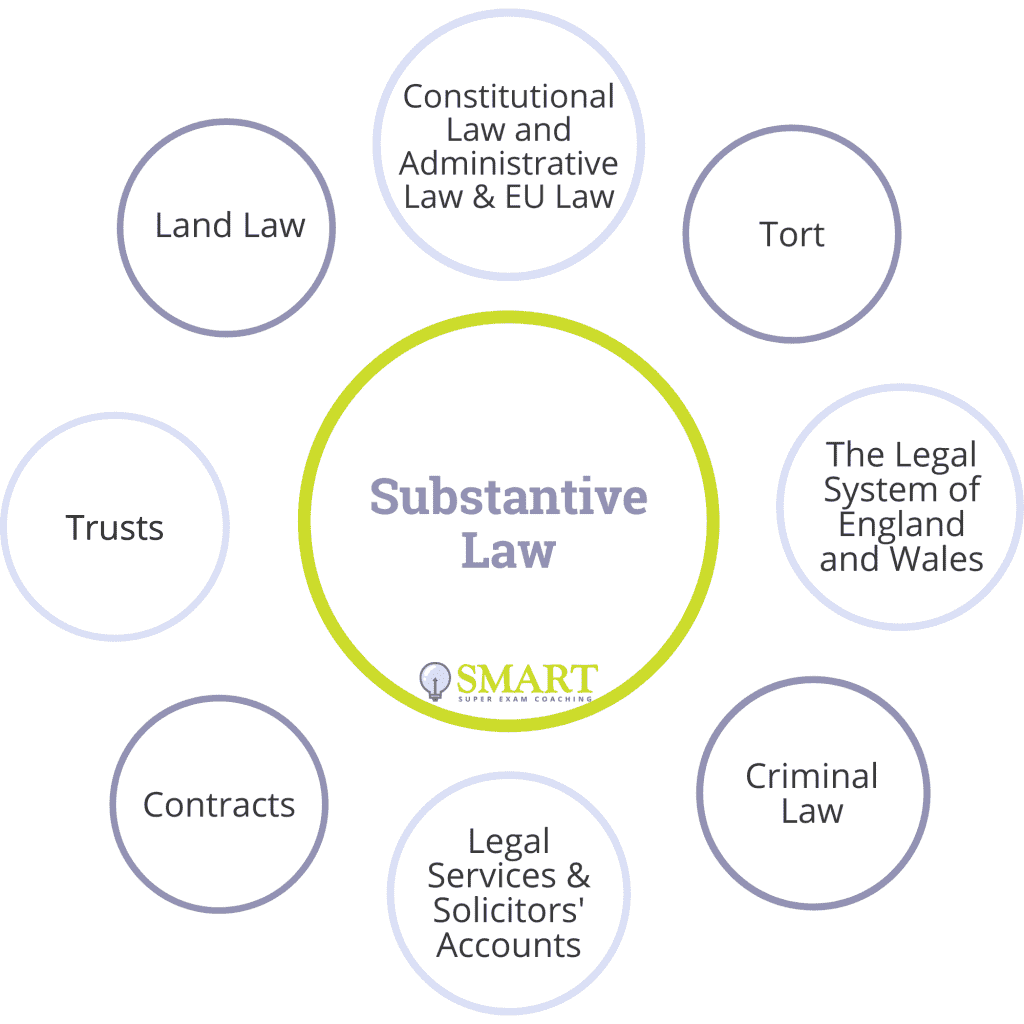
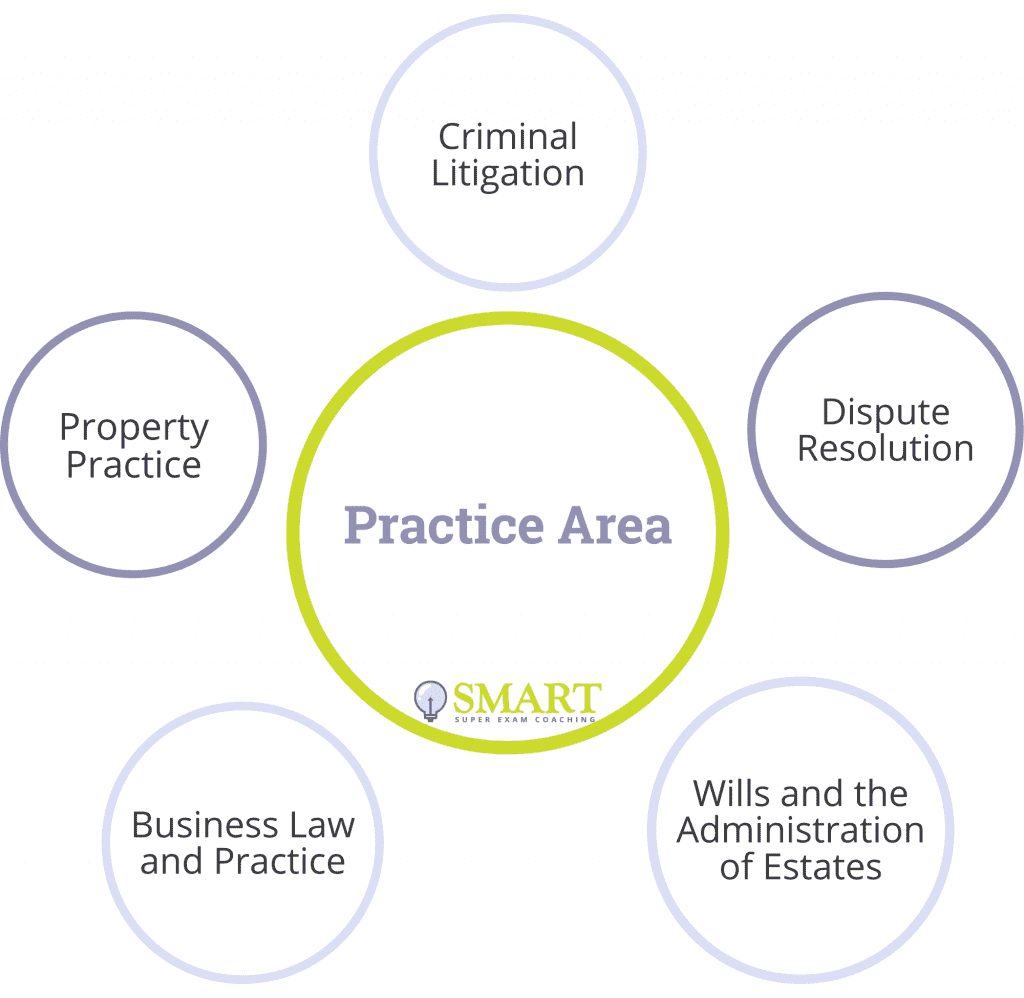
- Stage two – SQE2 consists of skills-based assessments based on simulations – exams in the form of real practical tasks, which a newly-qualified solicitor is expected to perform in a real working environment e.g. client interview, advocacy, legal research, drafting, writing, and case and matter analysis.

3. Gain 2 years of law-related work experience also known as ‘qualifying work experience’ (QWE) or practical legal skills, which may be obtained before, after, or during the process of passing SQE part 1 and SQE part 2, and must be confirmed by a solicitor of England and Wales or a Compliance Officer for Legal Practice (COLP). QWE may be obtained domestically or internationally, in a law firm or as an in house lawyer. Experience working in legal clinics should also be suitable as qualifying work experience.
4. Meet character and suitability requirements.
This article explains how to prepare for the first stage of SQE assessments – the multiple-choice test or SQE ONE – for a reasonable price and in a timely manner.
SQE1 exam methodology
SQE one is a computer-based test with multiple-choice questions (MCQs). It is modelled on the Miller Pyramid: a framework for assessing doctors’ clinical competence on two levels: skills and knowledge. In other words, it is not enough to know; your knowledge should also be actionable, i.e. one should be able to identify legal principles in the test and apply those to a practical factual scenario. For this reason, you should be very attentive to the small details given in the multiple-choice questions. Those are usually designed to test your understanding and qualify your answer.
In order to reach the highest standard of objectivity in the SQE1 assessment, the creators of the test have employed the method of a ‘single best answer’ question. This single best answer has to be clear and unequivocal, i.e. must not contain any ‘None of the above’ or ‘All of the above’ wording, to avoid confusing or tricking the examinees.

Solicitors Qualifying Examination (SQE) Stage One: Pros & Cons, Answers & Questions
SQE1 exam structure
If you are searching the internet for information about SQE part 1, don’t be surprised if you see different numbers for how many MCQs will be included in the assessment. There has been a long debate as to its structure and content. After careful consideration, discussions with the stakeholders and academics, and the SQE stage 1 pilot, the final design of the SQE1 has been decided as follows:
There will be 360 multiple-choice questions divided into two assessments (FLK 1 and FLK 2) – 180 MСQs each, assessed over two days. All the substantive law subjects and practice areas are divided into two groups and will be assessed jointly within each FLK as per the SQE1 Assessment Specification:
- FLK assessment 1: Business Law and Practice, Dispute Resolution, Contract, Tort, Legal System, Public Law, Legal Services
- FLK assessment 2: Property Practice, Wills and the Administration of Estates, Solicitors Accounts, Land Law, Trusts, Criminal Law and Practice.
There may be any combination of the subjects within each FLK if they might come up together in real-world practice.
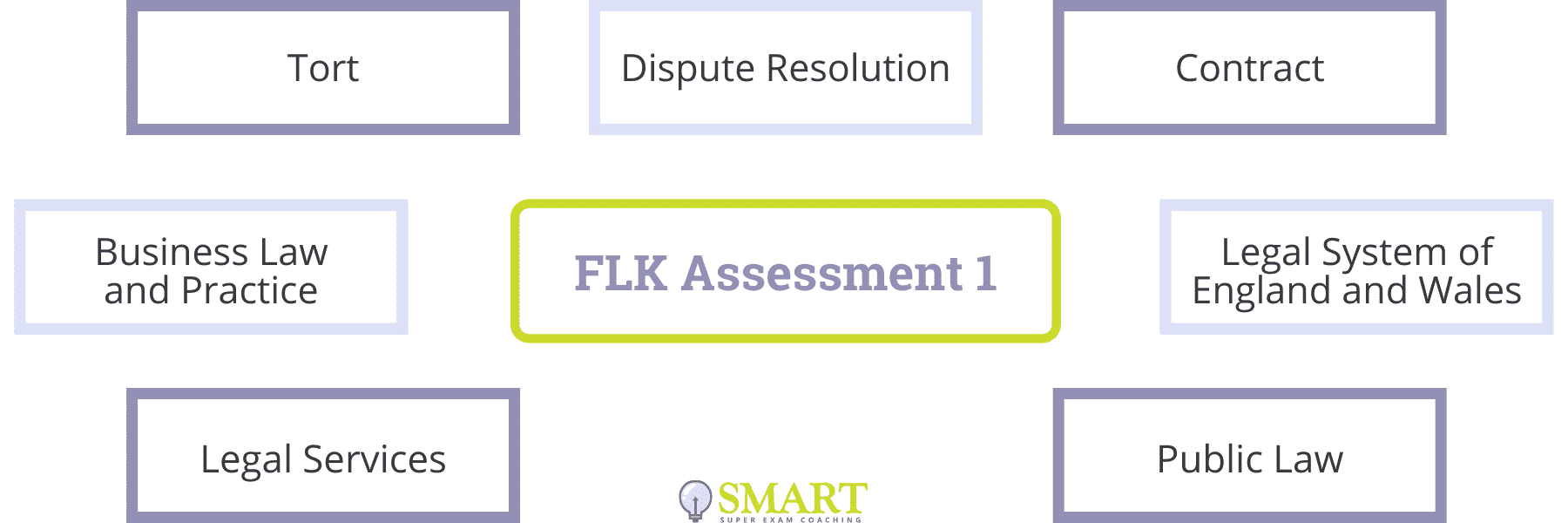
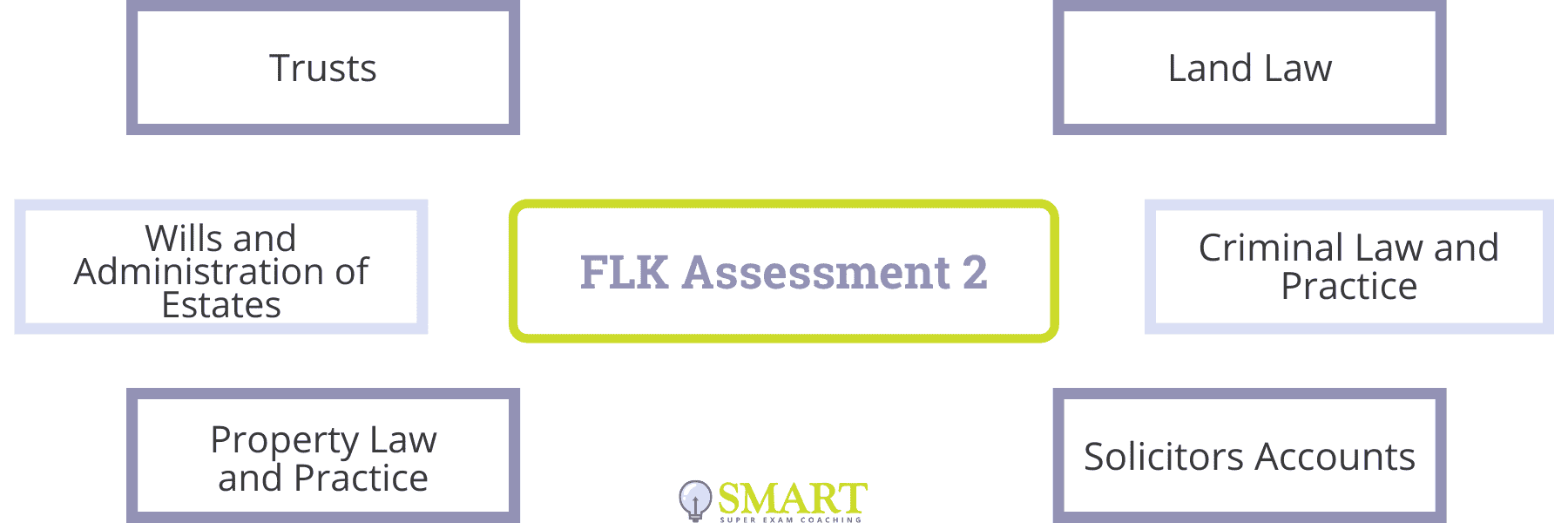
In the initial design of SQE stage 1, it was envisaged that the aspiring solicitors would also be tested on some skills elements: legal drafting and writing. After long consultations, SRA and Kaplan removed all the skills elements from SQE1 and these will only be tested in the SQE2 assessments. This means that it is possible for university students to prepare and pass this multiple-choice test and the preparation for that does not require any substantial work experience. However, real-world experience will be required for SQE TWO and to meet the Qualifying Working Experience (QWE) condition. If you are a student, try to obtain some sort of part-time law job; you do not need to be employed full-time to gain practical legal skills. Think of your work experience now and remember that it will need to be signed by a solicitor.
How to approach SQE1 MCQs
In general terms, in SQE1 you will be tested on the most common points of confusion in legal knowledge: legal principle(s) or concept(s) in which people who do not have the required depth and breadth of knowledge can make a mistake. The question may require the candidate to identify and/or apply and/or predict the outcome of and/or explain the legal principle or rule. Some questions in SQE stage 1 may even ask you to make calculations of tax or stamp duty or similar. While answering the SQE1 multiple-choice questions, you should not jump quickly to a conclusion just because, at first glance, it seems that one of the 5 possible answers is correct. Instead, you should draw out the differences between the given options and eliminate them: cross out all the answers you know are incorrect and to choose the best single answer from the remains.
Let’s have a look at a practical example from the FLK sample questions suggested by the SRA for SQE1:
Question 3, page 4, SQE1 Functioning Legal Knowledge sample questions 14 April 2020.
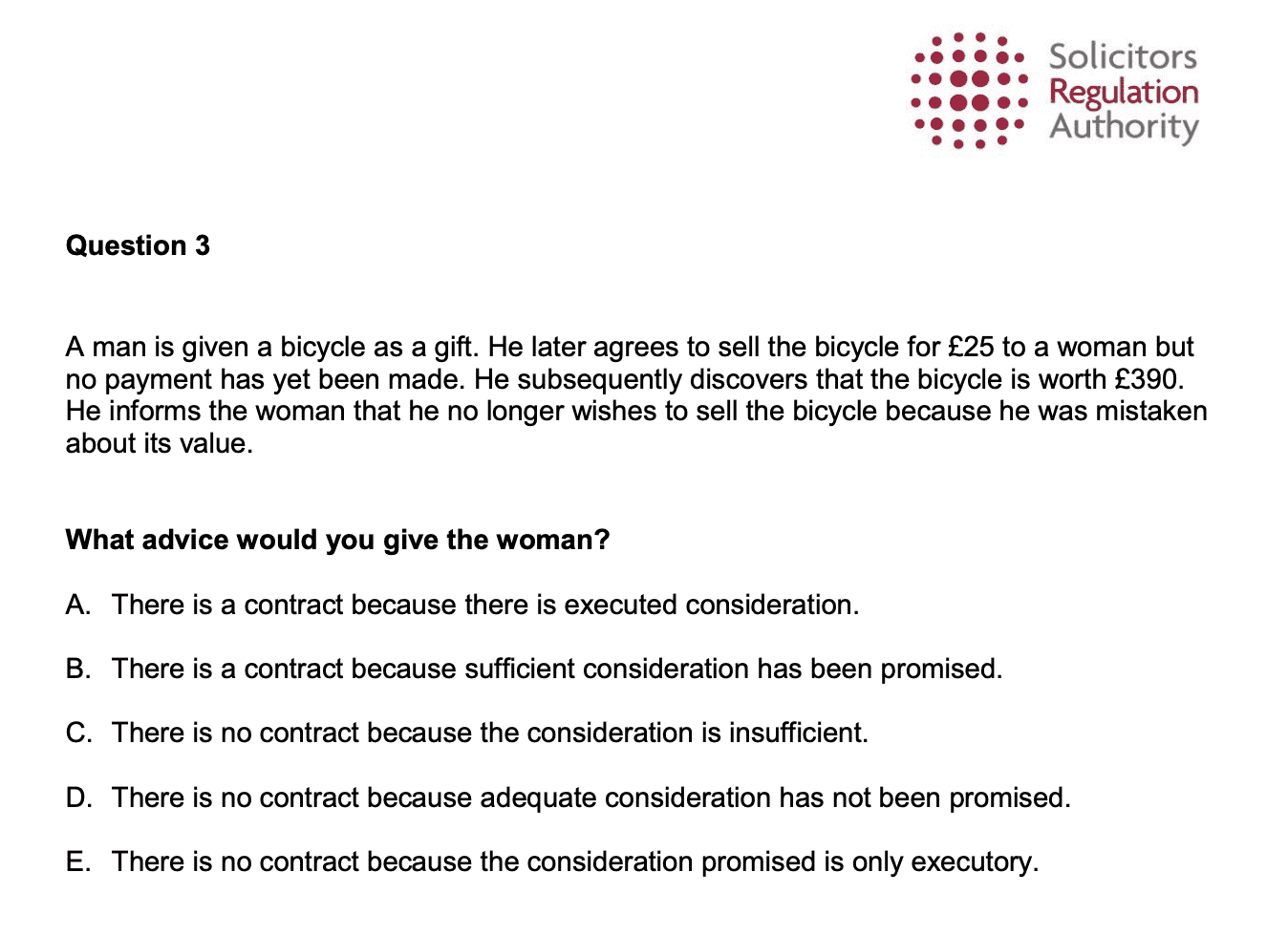
Firstly, the aspiring solicitor should identify that the question is testing on the contract formation principles under the law of contract. In particular, it is testing your knowledge of ‘contractual consideration’ and ‘offer and acceptance’. A consideration is an exchange of promises by the parties in a contract; a consideration can be anything, but must be of some value and must be accepted or agreed for the contract to be valid. In this case, the man has promised the consideration of a bicycle to the woman in exchange for a consideration of £25. A concept of ‘mistake’ also pops up in the question, but this is more a destructor in order to support the wrong answers.
Secondly, note that the actual question asks you to advise one of the parties involved – the woman. That means that you must argue her case. This is extremely important, because it makes the question more specific. In particular, this already helps you to subdivide the answers into two groups (i) A & B – there is a contract; and (ii) C, D & E – there is no contract.
Thirdly, referring to the actual wording of the main body of the question (also called the ‘stem’), we note that a price of £25 was offered and accepted (‘he later agrees to sell the bicycle for £25’).
So, you are being asked: can the man go back on his promise if the agreed consideration is not yet paid, or, in other words, would it undermine the contract’s formation?
The answer is NO, it would not. This, together with the fact that we are being instructed by the woman, eliminates answers C, D & E. The main difference then between the remaining answers A & B is that A refers to ‘executed consideration’ and B to ‘sufficient consideration’, which means only that consideration ‘has been promised’, and does not necessarily need to reflect the true value of the bicycle. The relevant legal rule is that consideration must be sufficient, but need not be adequate.
So, the correct answer to this FLK question is: B. There is a contract and she only needs to pay £25.
SQE1 preparation
It is essential to appreciate the substantial level of preparation you will need to undertake for SQE part 1, because the same or an even higher level of functional legal knowledge will be required for SQE2. Furthermore, there is a limited number of attempts you can make to pass SQE ONE: the regulator allows up to three resits within a six-year period. During your preparation for SQE1, please also gain as much work experience as you can.
The required preparation (knowledge) depends on your personal objectives. We can roughly subdivide all the aspiring solicitors into the following groups in a hierarchical order:
- Non-law degree/graduates – require the most solid preparation, which may take more than one year or even longer depending on how intensely you prepare.
- Non-LPC law graduates with no or very limited practical experience and knowledge of the practice areas – it may take you about one year or perhaps a bit less, as you will need to cover everything which was not covered during your LLB or GDL.
- Non-LPC law graduates with substantial practical experience and knowledge of the practice areas (e.g. paralegal, legal assistant, legal executive or trainee, legal clerk) including foreign qualified lawyers – depending on your objectives and availability, it may take from 2-3 to 10 months to prepare.
- LPC graduates – 2-3 months (SQE2), but maybe longer depending on your experience. For example, those LPC grads who had a training contract but were unable to complete their qualification, versus LPC freshers. Further information is available here on the SQE exam for LPC graduates.

We have conducted research on SQE preparation time and you can find a summary of the results here: QLTS and SQE: Prep Time Unveiled.
In general terms, preparation for SQE1 should cover the following stages:
- Stage 1 – obtain theoretical knowledge of the substantive law and practice areas;
- Stage 2 – make this knowledge sustainable and fixed in long-term memory by means of regular revision and some practical exercises; and
- Stage 3 – practice SQE1 multiple-choice questions and other practical exercises.
The easiest approach for many aspiring solicitors would be to subscribe for an SQE1 preparation course. However, please remember that you cannot buy knowledge, whether you prepare on your own or take a course. No matter which approach you decide upon, you will have to work hard, stay committed, and be ready to sacrifice your time and personal life in order to pass this difficult examination.

SQE1 prep courses
Your SQE1 preparation should be deep and thorough, as it will also serve as the foundation for SQE2. To reap the full benefits, do not delay the SQE2 sitting after taking SQE1 – make hay while the sun shines, as they say. As a training provider specialised in SQE2, we are only concerned with the knowledge retained after the SQE One – not with which training course you took.
When preparing candidates for the QLTS OSCE (predecessor of SQE2), we often saw aspiring solicitors failing multiple attempts to pass the second stage of the assessment – even though they successfully cleared the QLTS MCT (predecessor of SQE1) on their first attempt. This, in our opinion, was due to a basic lack of knowledge, as many of these candidates confirmed that they had prepared for the multiple-choice exam mainly by means of repeatedly going through numerous practice tests, effectively memorising them and forming an understanding of their logic. These aspiring solicitors mostly skipped reading books and manuals, with the exception of some summaries provided by their preparation courses. Some of those candidates unfortunately never managed to clear the skills exam, and after numerous attempts either gave up or returned to the law books to start again from scratch.
While deciding on an SQE1 preparation course, please consider the following (not in order of priority):
- What is the duration of the SQE1 course? Can the subscription be extended – and if so, on what terms and is there an extension fee? In the best-case scenario, your subscription should also cover access to the content during the period required to prepare for SQE2, since you will be assessed in the same FLK.
- What theoretical course materials does it cover? Ideally, it should include some lectures, manuals, and summaries, as well as some guidance on MCQ exam techniques. Interactive elements and group sessions like workshops and seminars are not really crucial unless they are devoted to multiple-choice test techniques.
- Are there any tutors/solicitors to answer your questions on the law in case you do not understand something? While offering personal tutor support is something a course can rarely afford, there should ideally be some system of supervision or direct contact in place.
- How many MCQs are included in the package? Can you see any sample questions before making up your mind? Firstly, keep in mind that the standard set for the SQE1 questions is very high. Each test item is assessed against the ‘gold standard’ in national licensing exams. The SQE1 pilot administered by Kaplan has demonstrated the reliability and accuracy required of a high-stakes licensing examination. So, make sure that the course materials and MCQs you purchase are of the same standard. Secondly, remember that there are some inexpensive or even free question banks available, so you may opt for a cheaper package and combine with these resources.
We generally do not recommend subscribing to packages which offer preparation for both SQE1 and 2. We have learned from our QLTS experience that some preparation courses may be better for SQE1, while others do a better job training for SQE2. If you sign up for a universal ‘cover-all’ package, you may eventually end up paying double the price. Furthermore, there may be a substantial time period between your SQE1 and SQE2 sittings.
SQE1 materials and tips
You should consider SQE1 preparation from two perspectives: theoretical knowledge of the law and practical skill to clear multiple-choice questions. You will need to focus on both during your self-preparation – with or without subscribing to an SQE preparation course. We are aware that a bulk of aspiring solicitors who qualified via QLTS managed to prepare and pass the QLTS MCT (equivalent to SQE1) by themselves without obtaining any tutor support. It all depends on your budget, availability and background.
For the theory part, first you should determine the scope of information required. To this end, please carefully study the Statement of Solicitor Competence and in particular the Statement of Legal Knowledge and the SQE1 Assessment Specification, as provided by the SRA. Don’t forget about the 90 MCQs available in the SQE1 Functioning Legal Knowledge sample questions, which is a great tool to prepare for the Solicitor Qualifying Exam and you can be confident that those questions will be similar to the actual exam.
Oxford University Press is developing an online product ‘SQE Prep & Practise’, which is not simply a manual but an online study tool. Its context fully reflects the context of the SQE assessments, e.g. the subjects are combined to reflect FKL1 and FKL2 (two collections) and it includes 200 MCQs for each subject with explanatory feedback on answers.
So, altogether 1,200 multiple choice questions will be available for £225 per collection or at a discounted price of £450 for both.
According to the information provided by OUP, this resource should be available for purchase from September 2021 and may be purchased by individuals.
The OUP tool is also supported by a specially-designed virtual learning environment with full analytics, which perfectly suits SQE exam self-study and incorporates different smart features, e.g. comparing grades with other candidates. Purchasing this SQE Prep & Practise product could be a solid alternative to subscribing to an SQE1 preparation course.
Please see below our tips on SQE1 for self-preparation (otherwise follow the guidance from your SQE preparation course):
- Choose an appropriate book or manual, which reflects the exam’s syllabus.
- Complement your reading with answering MCQs and do not delay the sample tests until the last minute – do them simultaneously with your theoretical SQE prep.
- You should understand the logic of the questions – the way they are designed. Refer back to the ‘How to approach SQE1 MCQs’ section above, and follow the same analysis for your first 20-50 MCQs.
- When you provide an incorrect answer to an MCQ, try to determine yourself why you made the mistake and find an explanation for the correct answer. Only after that, have a look at the explanatory feedback in the test if any is available.
- In order to not forget the subjects you have read before, arrange for some regular revision. For example, go through MCQs again on a subject with some regularity; you can simply revise your notes from one of the previous subjects before you move to a new one.
Sitting SQE1
You will be able to sit SQE1 in numerous locations in the UK and internationally. First you should check if there is a Pearson centre near you. This is not an issue for domestic candidates, but may be an issue for the aspiring solicitors from outside the UK. You can simply search for ‘Pearson centre’ in Google Maps. Even if you do find one nearby, keep in mind that not every centre is used for SQE1 purposes, so you may contact them directly to confirm.
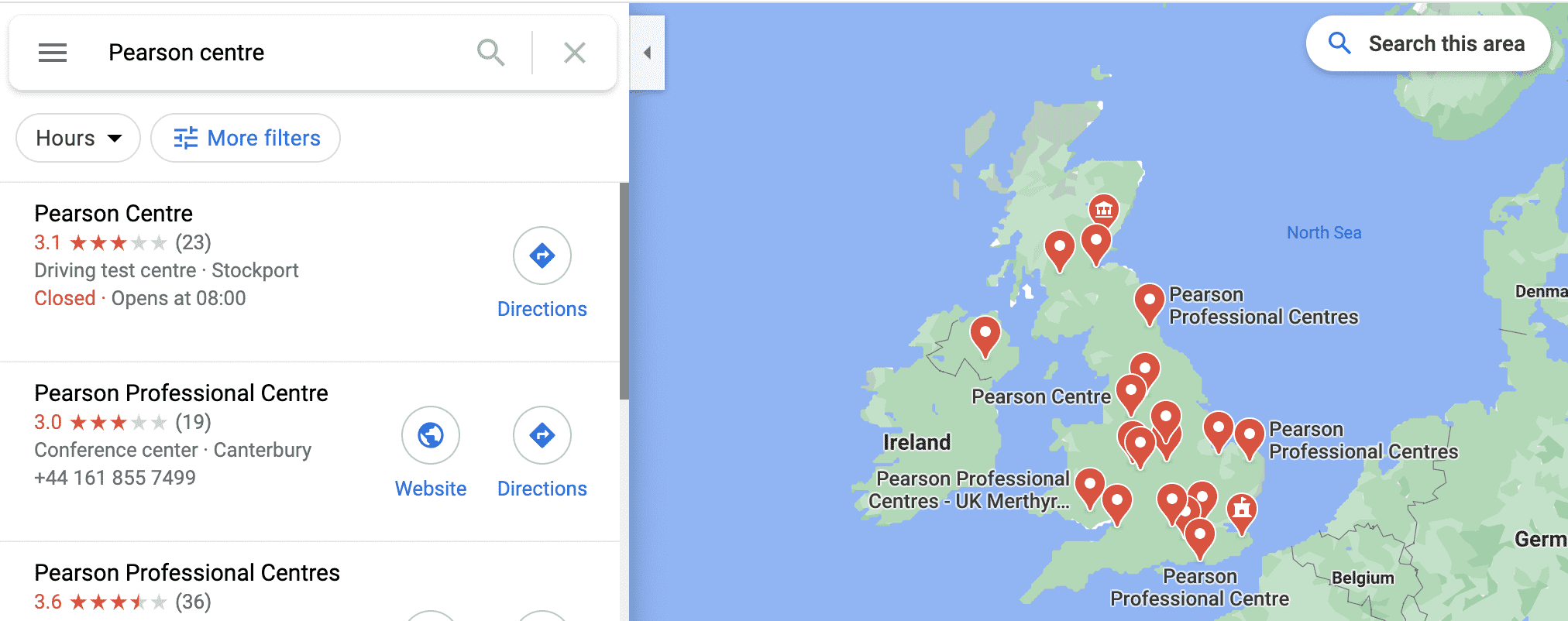
Very comprehensive guidline